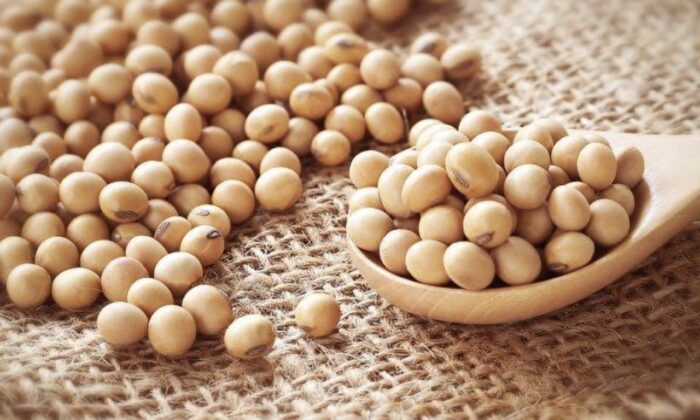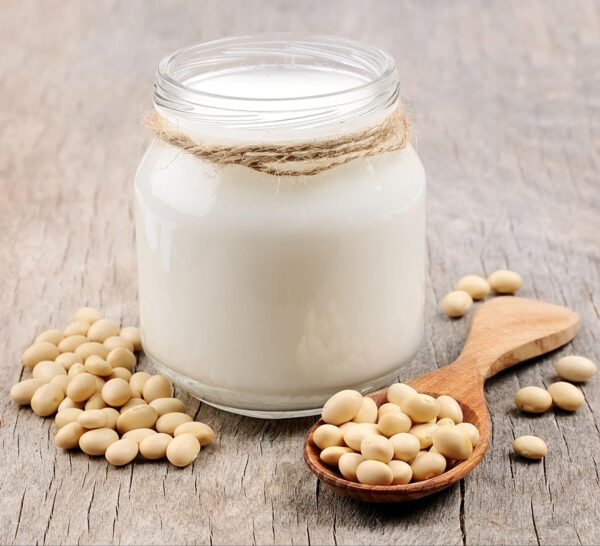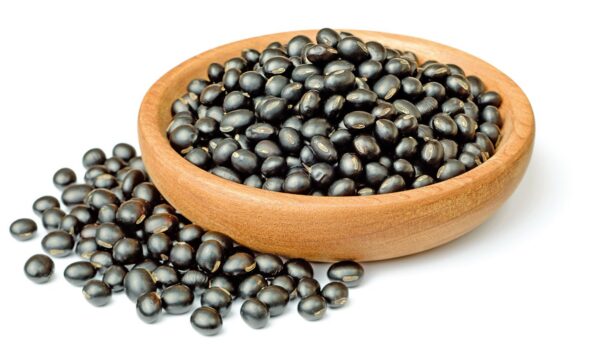The Power of Soybeans: Fight Cancer and Lower Blood Pressure
Soy, also known as soybean, has a reputation as the “king of beans.” Soybean is rich in dietary fiber, which can clean the intestines and promote peristalsis. Meanwhile, isoflavones contained in soybean have anti-cancer effects. Reducing Cancer Incidence According to figures released by the World Health Organization in February 2022, cancer is one of the leading causes of death worldwide. In 2020, nearly 10 million people died from various types of cancer. In a March 2022 study published in Frontiers in Nutrition, researchers pulled together databases from PubMed, Embase, Web of Science, and the Cochrane Library to include 81 studies in their analysis. According to the research, an increase of 25 grams of soy and 10 milligrams of soy isoflavones per day was associated with a 4 percent reduction in cancer risk, and the higher the intake of soy isoflavones, the lower the risk of cancer. Among beans, the highest isoflavone content is found in black beans, but since black beans are so low in production, all isoflavones sold on the market are derived from soybeans. Studies have confirmed that soy isoflavones can balance female hormones and have a good effect on the prevention and treatment of women’s menopausal syndrome and gynecological cancers. A 2009 study published in the Journal of the American Medical Association confirmed that regular soy consumption was associated with a lower risk of breast cancer recurrence and death. The researchers studied the effect of soy intake on breast cancer survival in 5,042 female breast cancer survivors (20 to 75 years of age) in China. After five years of follow-up, the group that ate more soy (11 grams of soy protein per day) had significantly lower rates of breast cancer recurrence and mortality than the group that ate less soy. Reducing Blood Pressure Soybeans are rich in potassium—up to 150 milligrams per 10 grams of soy. Potassium can promote the excretion of sodium salt. For patients with hypertension, eating tofu, soy milk, miso soup, and other soy foods can help stabilize blood pressure. Soy milk product with soybeans. Fotolia) On the Taiwanese health show “@ERA FOCUS2,” dietitian Li Wanpin recommended the special “double soy milk,” which is rich in dietary fiber and nutrients and can both fight cancer and clear blood vessels. Recipe: Cook 125 grams of soybeans and black beans. Combine with 45 grams of roasted peanuts (can be replaced by other nuts if you do not eat peanuts), 30 grams of rock sugar (can be left out according to personal preference of sweetness), 500 grams of boiled water (cooled to warm), and then blend them in a blender. Li explained that a cup of soy milk made from the above materials contains 8 grams of dietary fiber, which is a good intake for the elderly, children, those who eat mostly takeaway or fast food, and people who have difficulty eating a large number of vegetables. Whether for colorectal cancer prevention or to improve benign polyps in the large intestine, double soy milk is a good breakfast option. Double soy milk also has the effect of clearing blood vessels, said Li, who described the blood vessels as “the road,” and the soybean as “road cleaner.” What’s more, anthocyanin in the black beans can clean the “alley.” Peanuts can bring good oil to the body. Those who are allergic to peanuts or do not like their smell can replace them with their favorite nuts. In addition, the natural lecithin in soy can remove cholesterol attached to blood vessel walls, and prevent the hardening of blood vessels and cardiovascular disease so as to protect the heart. Lecithin is a good source of choline, which is a key nutrient for brain functioning. It is also associated with acetylcholine, our internal information transmitter. A lack of choline may affect the normal functioning of thoughts, reactions, and memory. Black beans, on the other hand, are rich in anthocyanins, which are natural antioxidants that are useful for cell repair, scavenging free radicals, and fighting cancer. They can also help clear blood vessels, reduce the incidence of cardiovascular disease, and lower blood pressure. Black beans are rich in anthocyanins, which are natural antioxidants that are useful for cell repair. (Shutterstock) Justin Lin, director of Singing Praises Traditional Clinic in Taiwan, said that in Eastern cultures, soy milk is customary for breakfast. “Besides dried bean curds and tofu, it is also eaten as a drink or dessert,” he told The Epoch Times on March 12. Lin suggested adding some soybeans when cooking rice: Not only will the rice become chewy, but it will also have a light bean flavor, which is beneficial for digestion. Recipe: Soak soybeans in water for four to six hours, drain them, put them into the washed white rice, and stew them together. Take Soybeans Correctly to Avoid Side Effects According to the Compendium of Materia Medica, an ancient Chinese medical book, soybean is “sweet, warm, nontoxic … beneficial to the large in

Soy, also known as soybean, has a reputation as the “king of beans.” Soybean is rich in dietary fiber, which can clean the intestines and promote peristalsis. Meanwhile, isoflavones contained in soybean have anti-cancer effects.
Reducing Cancer Incidence
According to figures released by the World Health Organization in February 2022, cancer is one of the leading causes of death worldwide. In 2020, nearly 10 million people died from various types of cancer.
In a March 2022 study published in Frontiers in Nutrition, researchers pulled together databases from PubMed, Embase, Web of Science, and the Cochrane Library to include 81 studies in their analysis.
According to the research, an increase of 25 grams of soy and 10 milligrams of soy isoflavones per day was associated with a 4 percent reduction in cancer risk, and the higher the intake of soy isoflavones, the lower the risk of cancer.
Among beans, the highest isoflavone content is found in black beans, but since black beans are so low in production, all isoflavones sold on the market are derived from soybeans. Studies have confirmed that soy isoflavones can balance female hormones and have a good effect on the prevention and treatment of women’s menopausal syndrome and gynecological cancers.
A 2009 study published in the Journal of the American Medical Association confirmed that regular soy consumption was associated with a lower risk of breast cancer recurrence and death. The researchers studied the effect of soy intake on breast cancer survival in 5,042 female breast cancer survivors (20 to 75 years of age) in China. After five years of follow-up, the group that ate more soy (11 grams of soy protein per day) had significantly lower rates of breast cancer recurrence and mortality than the group that ate less soy.
Reducing Blood Pressure
Soybeans are rich in potassium—up to 150 milligrams per 10 grams of soy. Potassium can promote the excretion of sodium salt. For patients with hypertension, eating tofu, soy milk, miso soup, and other soy foods can help stabilize blood pressure.

On the Taiwanese health show “@ERA FOCUS2,” dietitian Li Wanpin recommended the special “double soy milk,” which is rich in dietary fiber and nutrients and can both fight cancer and clear blood vessels.
Recipe: Cook 125 grams of soybeans and black beans. Combine with 45 grams of roasted peanuts (can be replaced by other nuts if you do not eat peanuts), 30 grams of rock sugar (can be left out according to personal preference of sweetness), 500 grams of boiled water (cooled to warm), and then blend them in a blender.
Li explained that a cup of soy milk made from the above materials contains 8 grams of dietary fiber, which is a good intake for the elderly, children, those who eat mostly takeaway or fast food, and people who have difficulty eating a large number of vegetables. Whether for colorectal cancer prevention or to improve benign polyps in the large intestine, double soy milk is a good breakfast option.
Double soy milk also has the effect of clearing blood vessels, said Li, who described the blood vessels as “the road,” and the soybean as “road cleaner.” What’s more, anthocyanin in the black beans can clean the “alley.” Peanuts can bring good oil to the body. Those who are allergic to peanuts or do not like their smell can replace them with their favorite nuts.
In addition, the natural lecithin in soy can remove cholesterol attached to blood vessel walls, and prevent the hardening of blood vessels and cardiovascular disease so as to protect the heart.
Lecithin is a good source of choline, which is a key nutrient for brain functioning. It is also associated with acetylcholine, our internal information transmitter. A lack of choline may affect the normal functioning of thoughts, reactions, and memory.
Black beans, on the other hand, are rich in anthocyanins, which are natural antioxidants that are useful for cell repair, scavenging free radicals, and fighting cancer. They can also help clear blood vessels, reduce the incidence of cardiovascular disease, and lower blood pressure.

Justin Lin, director of Singing Praises Traditional Clinic in Taiwan, said that in Eastern cultures, soy milk is customary for breakfast.
“Besides dried bean curds and tofu, it is also eaten as a drink or dessert,” he told The Epoch Times on March 12.
Lin suggested adding some soybeans when cooking rice: Not only will the rice become chewy, but it will also have a light bean flavor, which is beneficial for digestion.
Recipe: Soak soybeans in water for four to six hours, drain them, put them into the washed white rice, and stew them together.
Take Soybeans Correctly to Avoid Side Effects
According to the Compendium of Materia Medica, an ancient Chinese medical book, soybean is “sweet, warm, nontoxic … beneficial to the large intestine, [and can] eliminate the poison of swelling.” However, be careful not to consume too much if consumed directly, because “excessive taking [of soybeans] can obstruct qi, generate phlegm, make one cough, make the body heavy, make one’s face yellow and grow sore scabies.”
Lin warned that raw soybeans contain harmful ingredients such as trypsin inhibitors, saponin, and red blood cell lectin. Those who eat them uncooked are prone to food poisoning symptoms such as dizziness, nausea, vomiting, and diarrhea.
Soy is also a high-purine food, which should not be eaten by patients with gout because gout is mainly caused by the disorder of purine metabolism, which leads to the increase of blood uric acid.












